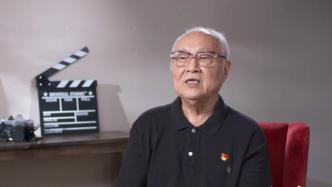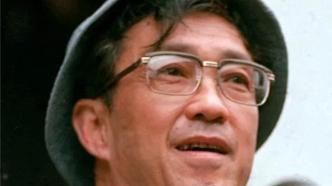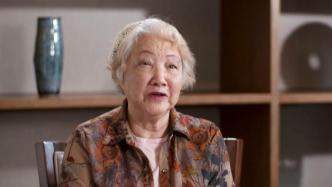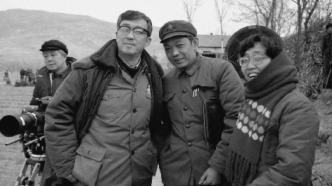
"The era has Xie Jin, but Xie Jin has no era." Although today's young people rarely have the opportunity to see Xie Jin's movies on the big screen, classic old movies are still active on the Internet and people's spiritual and cultural lives in other forms. middle.
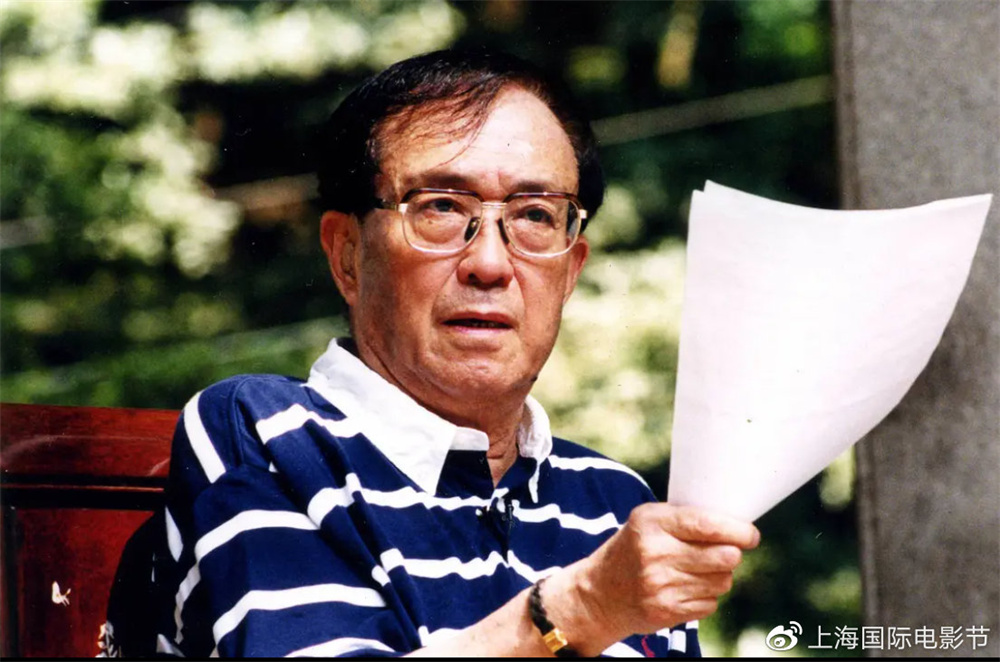
Xie Jin
"Garland Under the Mountain" is a work that has been created by a large number of self-media commentary videos in recent years. The titles of these videos are often labeled as "China's best war film". In the long and short videos, today's viewers can see that they can re-enter the distant Sino-Vietnamese border battlefield and those years from the perspectives of different characters. On Douban, this movie has a rating of 9.5, which is the highest rating among all Xie Jin's works.
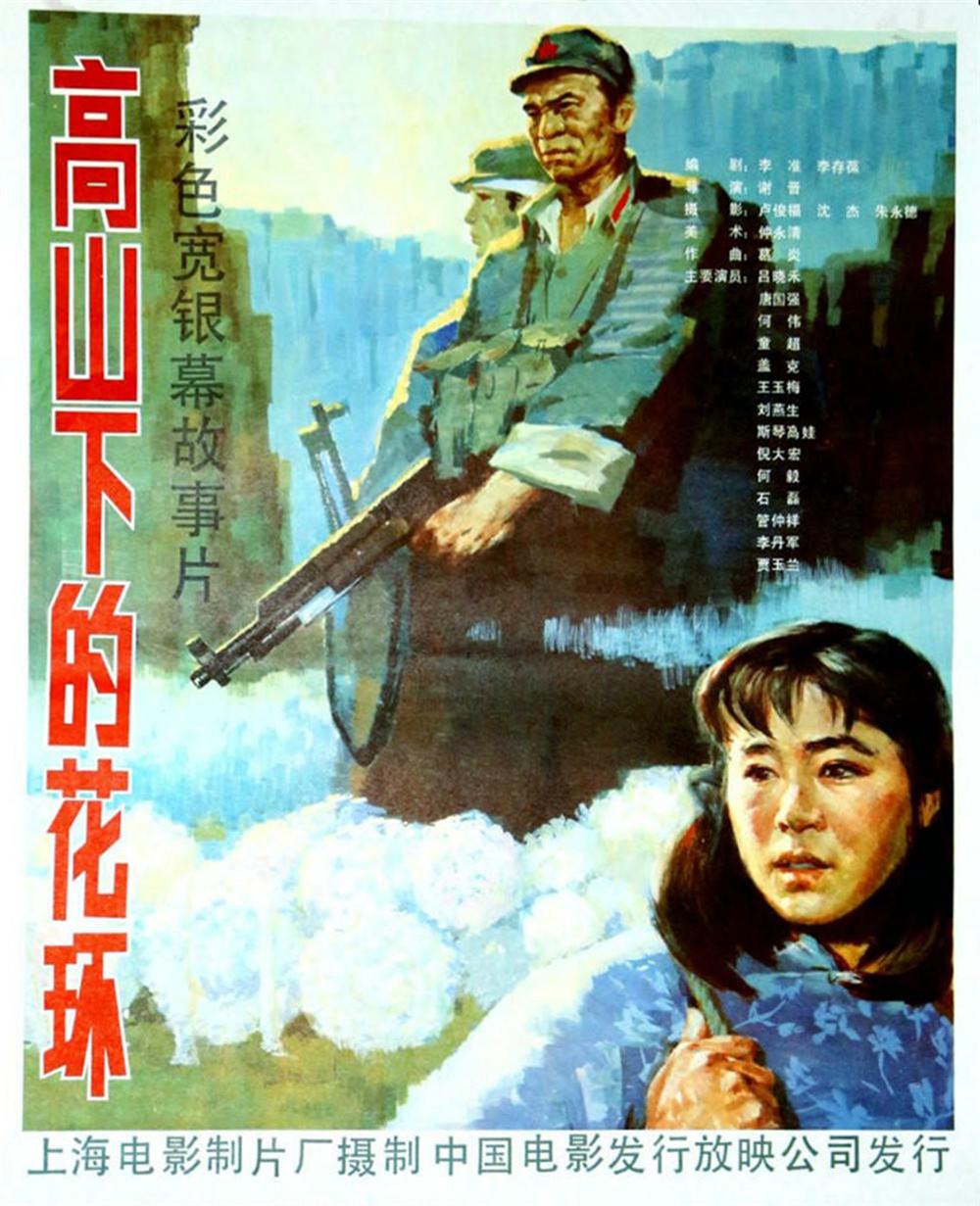
"Wreaths Under the Mountain" poster
In the movie, Xie Jin uses his unique vision and techniques to add meticulous and affectionate feelings to the cruel and rough style of military war, showing the human soul through the smoke of gunpowder, and the smell of gunpowder mixed with human touch. Liang Sanxi's sacrifice of the unpaid bills soaked in blood, Zhao Mengsheng's "Little Jiujiu" who escaped before the battle, Jin Kailai's third-class meritorious service that was not rated as "naturally unacceptable", Commander Lei's backdoor fire on the battlefield and the pain of losing his beloved son on the battlefield, Xiao Beijing can't make a dud of "criticizing Lin and Confucius"... Xie Jin faces the great era that has opened up the world, and it also contains thorns that need to be chopped. From his perspective, the feelings of family and country are not castles in the air, and sacrifice does not have to be heroic and passionate. It doesn’t have to be so lofty. All kinds of people on the battlefield are woven into a network. Xie Jin takes the shooting and expression of war films to a new level, bold but without losing proportion.
In terms of shooting technology, this movie is my country's first multi-camera film. The scenes are exquisite and shocking, whether it is the real weapons and equipment (62 tanks, 170, 56, etc.) or the details of tactical actions (one-handed reloading). Clip, Three Three Styles, etc.), or the "rigorous scholarship" of the main creators analyzing foreign reference films frame by frame, all gave the audience at the time a brand-new audio-visual shock.
In the 1980s, the novel "Wreaths Under the Mountain" became popular all over the country. There were more than 20 stage versions of the drama, and film adaptations were a hot topic that various studios competed for. When Shanghai Film Studio discussed the adaptation authorization with the original author Li Cunbao, they had a trump card in their hands that Li Cunbao could not refuse, which was "directed by Xie Jin".
From 1982 to 1984, for three years, from novel adaptation to on-site location scouting, from scouting for actors to experiencing life, from arduous filming to completing post-production, Wu Zhennian, the female director of Shanghai Film Academy at the time, who was the deputy director of the film, followed Xie Jin The filming notes of "Garland Under the Mountain" were compiled and published together with my subsequent memories and insights. The title of the book is based on the poem "Zheng Chen Mixed with Wine Traces" by the director Xie's favorite poet Lu You.
In the book, Wu Zhennian wrote that he was selected by Xie Jin just like "Fan Jin passed the exam" and became his fourth assistant director after the "Cultural Revolution". In order to prepare for the filming of this movie, she went to the front line alone to select locations, went into real battlefields with the troops, and was even mentally prepared to "sacrifice her life for the movie"; she traveled across the country to find the right person in Director Xie's mind Actor, and led the actors in underground life and sketch rehearsals, watching everyone transform; she made herself "more manly than a man" and only slept for two or three hours almost every day on the set. The lessons of blood and tears of "wasting the opportunity" because of a moment of laziness and selfishness; from the early text adaptation, to the mid-filming discussion with Director Xie on the metaphysical philosophy of tragic aesthetics, to the later film release in the face of many political climate changes, Moo Zhennian as a The person closest to Xie Jin's creation experienced the entire creation process of this film, and later continued to collaborate with Xie Jin on film and television works such as "The Last Noble" and "Under the Roof of Shanghai".
On the occasion of the 100th anniversary of Director Xie’s birth, The Paper reporter and Wu Zhennian, the retired Shanghai Film Director, discussed again the creation of this “war movie”, Xie Jin’s unique working methods, artistic concepts, as well as his ambitions and disappointments.
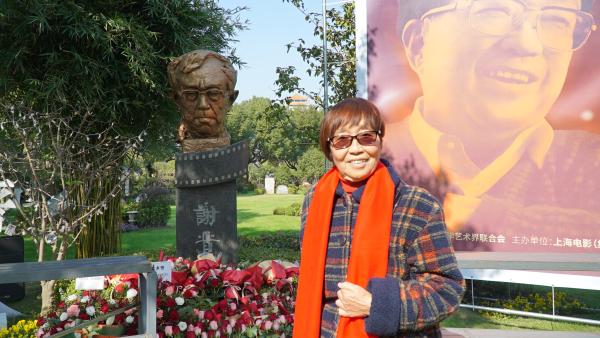
Wu Zhennian took a photo in front of Xie Jin's sculpture. The Paper reporter Cheng Qianqiantu
【dialogue】
The filming of "Wreaths Under the Mountain" was based on "Apocalypse Now"
The Paper : You mentioned in your book that when you were filming "Garland Under the Mountain", you were already over 40 and had made some films. Why did you take the initiative to ask Ying to be Director Xie's assistant?
Wu Zhennian : I actually went to a film college and then to Shanghai Film Academy. Until I made a film for Director Xie, I didn’t know what a movie was or what it was about. Director Xie went from leading me to write scripts, to finding actors, leading actors to rehearse sketches, to shooting and walking through the field every day... It was through this process with Director Xie that I understood everything in detail. What is a director. Later, it was only with his encouragement and guidance that I had the confidence to independently shoot an award-winning film like "Fake Girl."
The Paper : Our country has gone through a long war before, and has also made many related films, leaving many "red classics". However, the temperament of "Garland Under the Mountain" seems to be different. How did this change happen? of?
Wu Zhennian : Every era has its own classics. When this movie was filmed, we were already in the era of reform and opening up, and the country had already opened its doors. At that time, Director Xie took us to watch a lot of reference films, most of which were relatively modern war films from the Soviet Union and the United States. The most-watched "Apocalypse Now" by the famous American director Coppola, the human nature in war shown in it is something we should learn from. Director Xie already had that awareness at that time. He wanted to make a modern and international film. Something that can be transformed and can be retained.
At the same time, through our repeated viewing and pondering, we all sat there "pulling the film" and analyzing it shot by shot, and found that there was a "big secret" in their shooting - multi-camera shooting and lens assembly can turn a single The aircraft photos show the posture and style of more than a dozen aircraft. I was so excited when I saw it! Director Xie also suddenly realized it and said, "It turns out that multi-camera shooting has such great magic!" As a result, the factory also gave us "preferential treatment" and we became the first multi-camera film in China.
The Paper : It was a multi-camera production as soon as you started it. Was it "exciting" to shoot?
Wu Zhennian : That was really "so cool"! I'll tell you the truth, it's really painful. At that time, the film was shot on imported film, which was very valuable. At that time, the "film consumption ratio" was usually 1:3.5. Xie Jin is a great director, which is special. "Garland Under the Mountain" was criticized for a film consumption ratio of 1:5. But this "5" is the total consumption ratio of all the machines combined. When we use the most, we shoot with 7 machines at the same time, and there are also many times when we shoot with 3 or 5 machines at the same time. This means that the average number of each machine is higher. not enough. Therefore, when shooting, several machines cannot be turned on at the same time. At that time, I was doing arithmetic problems every day. According to the director's storyboard, I had to decide that when shooting this scene, some machines would be turned on first and some would be turned on later, so the machines had to take turns. We could only go through many shots in one shot. Mistakes are allowed. I remember Pan Hong once told me that our Chinese actors are so amazing. With such a low film consumption ratio, we still have to go to the international arena to compete for the best actor and actress awards. We need to be so successful. Under tense circumstances, it is really rare to perform in a relaxed, precise and precise manner.
The Paper : In fact, as a "war film", Director Xie is also anti-genre in many aspects. For example, the sacrifices of characters such as Liang Sanxi and Jin Kailai on the battlefield happened naturally and suddenly, unlike in the past in our country. War films deal with heroic sacrifice very differently. What did Director Xie think about this kind of drama?
Wu Zhennian : If you really go to the front line to cover the war, all the deaths will be very sudden. During the early visits, I asked the soldiers more than once about the scene when your comrades died. They were all silent and speechless. Director Xie Jin also felt the same way and deeply affected me. Director Xie handled the tragedy of the heroes' sacrifice brilliantly in that he did not directly sensationalize the situation on the battlefield, but placed the exaggeration after their sacrifice - the reaction of their families, such as Aunt Liang holding the unpaid bills. Repeatedly saying "We must pay back, we living people must pay back!" Just when we all felt that this would be the most tear-jerking power of the film and were moved by it and felt that the film was over, Director Xie quietly postponed the film until A kind of "reverberating sound" situation. He made the screen appear on the screen as a jeep was driving away in a canyon with overlapping mountains. Sitting on it were Aunt Liang and Yu Xiu, who were holding a baby in their arms. They were as calm as water. At the same time, he allowed a close-up shot of Commander Lei's military salute standing on the top of the mountain to appear on the screen in a solemn and slow movement. What is even more surprising is that the picture is accompanied by a monophonic bugle sound that seems to be floating from the depths of the distant mountains... Imagine what a charming ending this is! Only then did I really feel Director Xie's profound thoughts of elevating "war movies" to a higher latitude and a more spiritual and symbolic meaning! This kind of artistic technique is really something I will never forget! It is really a blessing that today's young audiences can enjoy its artistic charm!
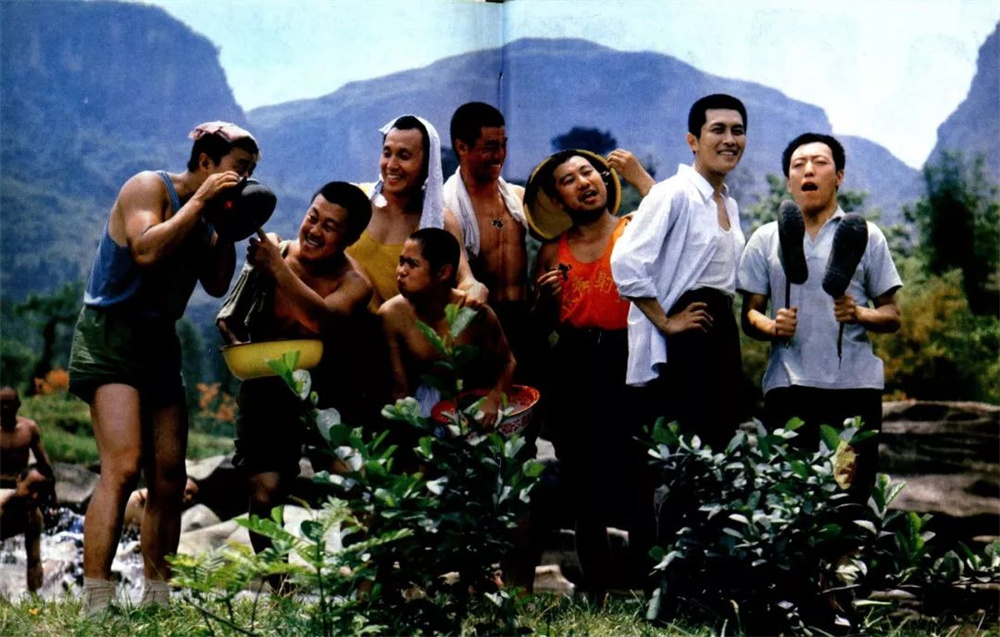
Stills from "Wreaths Under the Mountain"
The Paper : Did you know that more than thirty years later, many people on the Internet today evaluate it as "the best domestic war film"?
Wu Zhennian : Really? If there is such an evaluation, I am proud of Director Xie. To be honest, for a long time, the participants, including myself, thought this was a "war movie", and we also shot it in the style and scale of a war movie. But later on, and even today, I realized that Director Xie didn’t really want to make a war movie. The war was just a package. In this local war, two soldiers, Liang Sanxi and Jin Kailai, both made sacrifices. , the children of high-ranking cadres played by Tang Guoqiang escape from battle. With these contents, there would be no such story without war.
But the content that Director Xie buried in it, the real core, as time goes by, is still his feelings about his family and country, which can be summed up in one sentence: "I don't care about my country despite my humble status." A low-class common man whose family owes bills will not hesitate to make any sacrifices when the motherland needs him. If a country has such people as its backbone, can it not be prosperous and strong? This feeling of family and country is also consistent in Xie Jin's films.
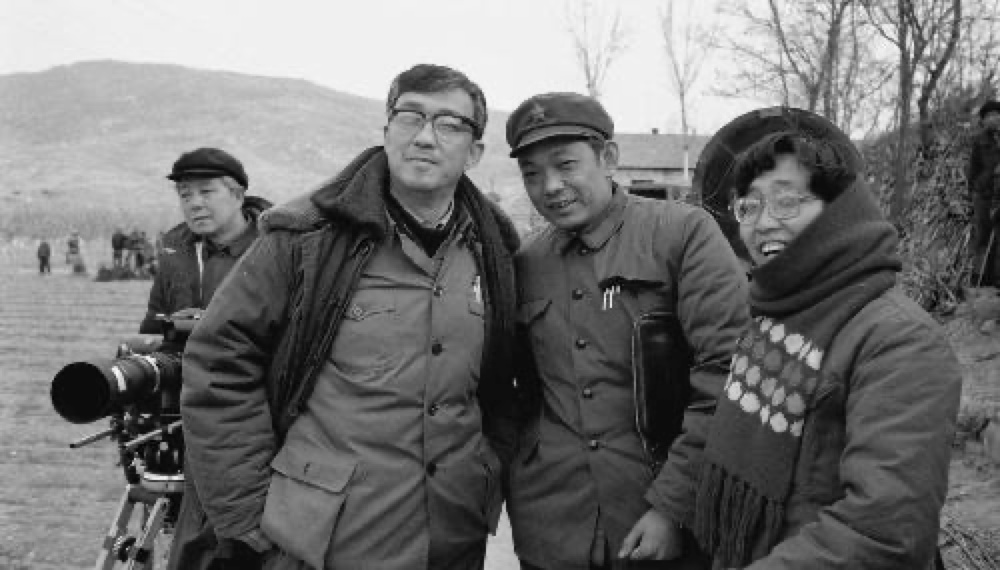
On December 22, 1984, Xie Jin (third from right), assistant director Wu Zhennian (first from right), and screenwriter Li Cunbao (second from right) were on the shooting scene of "Garland Under the Mountain".
He has a pair of "clairvoyance eyes" and "magic hands"
The Paper : Every actor in "Garland Under the Mountain" is outstanding, and each actor seems to be very different from himself. How did you assemble such a lineup?
Wu Zhennian : I have benefited from the selection of actors for the rest of my life. Before departure, Director Xie Jin dictated a "score" of his characters, and each character would find a corresponding note on the staff.
Liang Sanxi grew up eating dried sweet potatoes and is earthy, but his eyes are very important, they must be deep and affectionate; Jin Kailai is a short guy, and if he can cooperate with Siqin Gaowa, his sense of humor will naturally come out; Zhao Mengsheng The appearance is gentle, but there must be something ugly in the heart; Duan Yuguo wants to be ugly, but beautiful; "Little Beijing" - a pair of wise eyes, attractive; Aunt Liang is kind, with "wrinkles carved by a knife" on her face; Commander Lei is not that burly The molds of bodies and booming voices are mortals filled with emotion... Each actor has only a few lines, but there is much learning to be found in them.
So, I searched based on Director Xie's "score", and what was the result? Director Xie was very satisfied with the image, but internally, I was a bit "misjudged". Liang Sanxi is the tragic character in the play, but in fact this person is very humorous and lively. He imitates Lenin, Stalin, and Jiang Zemin so vividly that everyone is often amused by him. Director Xie will get angry because he is joking. No, Allow him to laugh. After the filming, Director Xie apologized to him and said he was sorry for suppressing the bohemian in you. You are a very good comedian. I hope you can find a good opportunity to act in comedy in the future. Although he did not encounter such an opportunity later.
Jin Kailai looks like a rough-and-tumble guy, but he is actually a very delicate person at heart, even a bit of a "softie". He writes down various requirements very carefully, but this kind of meticulousness makes him feel uncomfortable when rehearsing the sketch at the beginning. , pursuing the superficial too much seems "greasy", which is totally wrong. Director Xie once used very hot language and powerful movements to show him the core of Jin Kailai during a rehearsal, and said to him, "How many Jin Kailai are there in our lives? You, He Wei, are doing the best for thousands of people across the country." A person like Wan Jin Kailai speaks!" This statement stirred up everyone present.
Tang Guoqiang took the initiative to write to Director Xie. At that time, despite his great reputation, he also had difficulties. He hoped that Director Xie would let him play Zhao Mengsheng and change his situation of being a "little boy". Director Xie asked me to bring him a letter that read, "If you fight with your backs against the odds, your soldiers will win." Tang Guoqiang completed his transformation with this play. The breath that Director Xie saw him holding was the same breath that Zhao Mengsheng took after he suffered humiliation.
After the filming, I found that I had "made a mistake". Director Xie did not make a mistake. He fully understood the actors' inner strengths and weaknesses, and used various methods to help them maximize their strengths and avoid their weaknesses, even the parts they themselves didn't know about. He can see it all and dig it out.
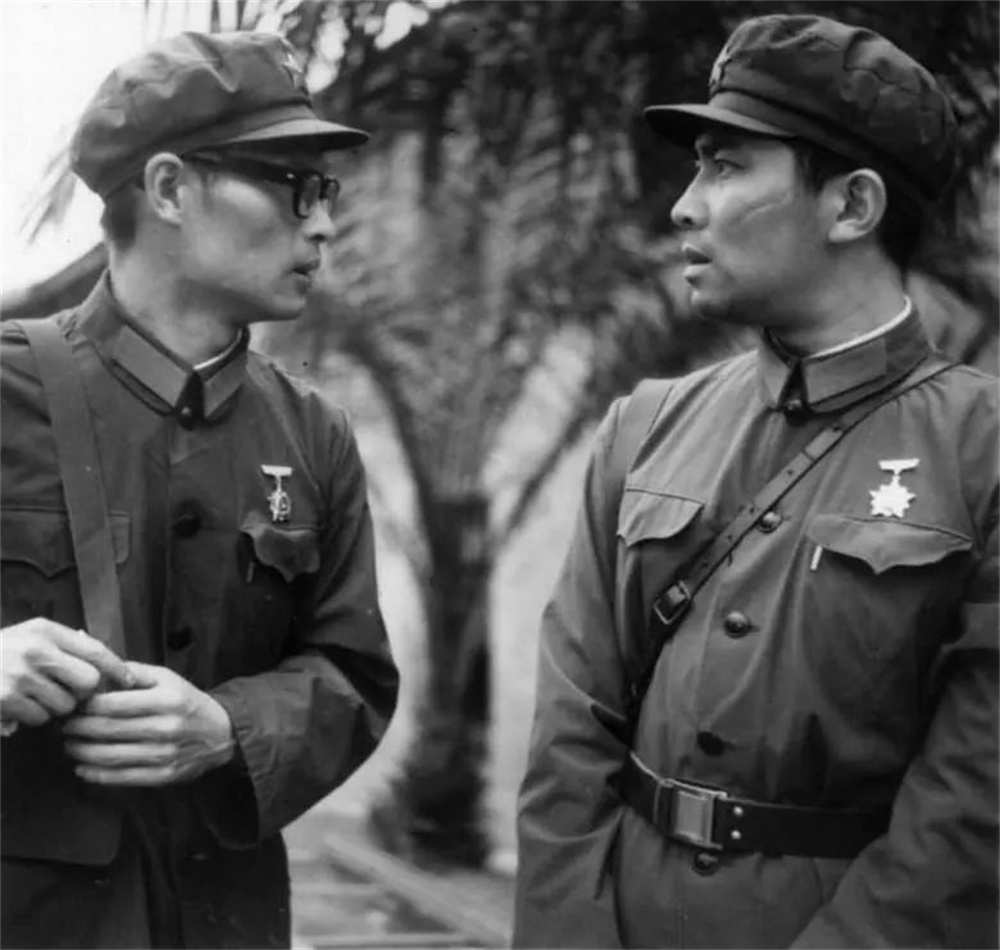
Stills from "Wreaths Under the Mountain"
The Paper : Director Xie has achieved great results in discovering and "training" movie stars. As an assistant director who helps him choose roles, how do you understand his talents and methods in this area?
Wu Zhennian : My understanding is too deep. The director is a "decathlete", and Director Xie is also a master of all talents. But he is extremely outstanding in this part of his intuition about actors. The training and processing of performances are among his strengths. Not only can he be particularly sensitive to discover and capture the characteristics of actors, but he also has many "tricks". All the actors who have been trained and controlled by him will be successful in the future film industry. He has a place in the world, and some even change his life. He really has a pair of "clairvoyance eyes" and "magic hands".
In my book "Zheng Chen Mixed with Wine Traces", I once summarized a set of metaphors:
The first type is a mature performing artist, which is called "actors who build bridges and cross rivers by themselves." Representative figures include Teacher Yu Zhi in the movie "Qiu Jin". Playing a supporting role, there weren't many scenes, but the little scenes he did performed were amazing. Director Xie's directorial mission seems to be to appreciate and praise his confidant.
The second type is experienced actors, who can be called "director Xie builds the bridge and the actors cross the river themselves", like Pan Hong. In the movie "The Last Noble", Pan Hong was not very sure about playing the daughter of a diplomat in the Kuomintang era. Director Xie's advice was equivalent to giving the actor a key to unlock the character. The actor himself could unlock it. Enough to control the creation of characters.
The third type, actors with talent but lack of acting experience, is called "director Xie builds bridges and helps actors cross the river." When he acted in "Youth", Chen Chong didn't have much acting training or experience, but Director Xie felt that Chen Chong had a cute appearance, innocent personality, and smart talent, which made him suitable for this role. With this foundation and Director Xie's training, he was not only very good The success also allowed her to embark on the glorious path of acting.
There is also a fourth type, actors who only fit the appearance and temperament of the role, but lack talent and experience. If the director does not have considerable control and training capabilities, he would not dare to choose this type of actor. But Director Xie has such courage and ability. He not only dares to use it, but also uses it very well. For example, the heroine in "The Legend of Tianyun Mountain" is actually relatively dull, but Director Xie once told me the secret of training such actors: He said, "What is a movie? A movie is a connection between shots, then you Controlling the actors one shot at a time, their lines, movements, expressions, details, down to every frown, smile, and every gesture were within the control range." As a result, this character was completed and became popular across the country. This is called "Director Xie builds a bridge and carries the actor across the river". This is undoubtedly a very hard and tiring thing. You have to follow closely throughout the whole process and never let go until the last shot.
The Paper : It stands to reason that Xie Jin is a person with such a keen intuition for actors. At the same time, he loves the character Feng Qinglan very much. So why would he choose an actor who can't act?
Moo Chin Nian : Of course, it is impossible for any director to never make mistakes in selecting actors. He also had regrets on certain characters, but I think his superior directorial ability can make up for it. Let me take the heroine Yu Xiu in "Garland Under the Mountain" as an example. I have personally participated in this play, so I may be better able to answer this question.
I also don’t think Yuxiu’s actress is good at acting, she’s a city girl, and she wanted to marry a foreigner at that time. I said, how can such a person play a kind and simple rural girl, or a family member of a soldier? Director Xie said, "She has a 'widow's face', didn't you see?" I suddenly understood why the internationally renowned documentary director Evans praised Feng Qinglan as "a Chinese woman" after watching "The Legend of Tianyun Mountain" "First person", her face is clearly filled with the kindness and simplicity of Chinese women.
When Xie Jin looks at a person, he first needs the face to be that of a character in the movie. There is no way around it. When making a movie, the first thing is the image. The character image is a kind of artistic intuition, and then the inner investment, expression, and exploration are the things that come later. And the accuracy of this kind of intuition is so important to a director.
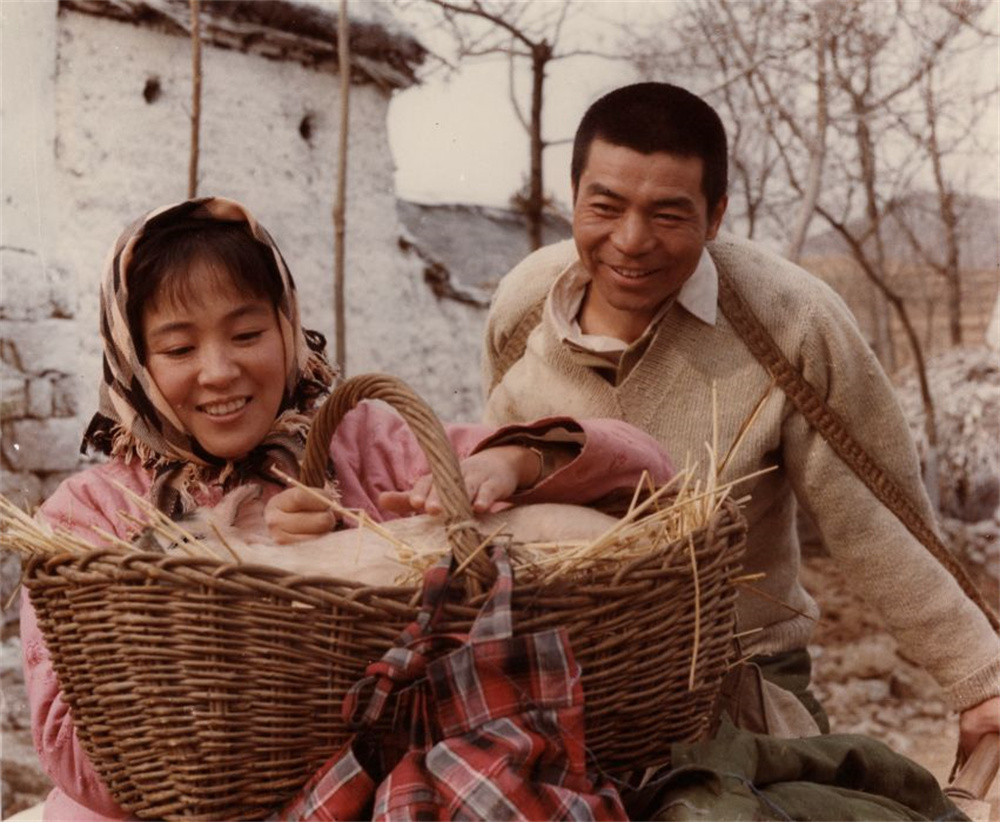
Stills from "Wreaths Under the Mountain"
He is making works for posterity
The Paper : Many viewers today still lament that many of the scenes in "Wreaths Under the Mountain" were quite large in scale. What kind of pressure was there when filming?
Wu Zhennien : When filming "Garland Under the Mountain", the overall environment was relatively relaxed, and everything I wanted to say could be fully expressed. But on the other hand, Xie Jin's ability and courage to express through movies were actually honed step by step. . Director Xie once told me that he had regrets when filming "Legend of Tianyun Mountain" before. He kept saying repeatedly that the character Zhong Xinghuo was too flat, simplistic and symbolic. In fact, he should also be a complex character, a victim, and loved his wife very much, but these were not written out. Including the love scenes between Wu Qionghua and Hong Changqing in "Red Detachment of Women", which were all cut out, he also felt regretful for the rest of his life.
The Paper : "Garland Under the Mountain" is more talked about today than literary drama. You also said in the book that Xie Jin is actually "another Jin Kailai" and he uses this character to speak his own words. ? Could you have foreseen the popularity of the clips that are still going viral today?
Wu Zhennian : Of course Xie Jin used this character to speak for himself. He is sharp and restrained at the same time. He has a very angry side and he has great creative desire for the character Jin Kailai. Director Xie's critical thinking begins with his "Reflection Trilogy". Looking at it today, everyone can still see the part that transcends the times. Good works and good artists can transcend time and space, whether it is literature, art, music, Movies, I believe that any work that can transcend time and space has its creators consciously aware of it when creating it. So today the Internet says which of his works are "masterpieces". Although I don't watch these short videos, I am not surprised at all by the sound you told me. Xie Jin's works never "suddenly resonate". Director Xie is A person who has long wanted to be "famous for generations to come" will create works for future generations.
The Paper : You also wrote in your book that he wanted to make a "blockbuster" at that time. What does this so-called "blockbuster" look like? Does the later "Opium War" count?
Wu Zhennian : Yes, it is this kind of thing. The scale must be large, and it must span history and borders. He must stand at the forefront of this history and era to do this, and it must be passed down across time and space. This is called Blockbusters. This is what I understand. In this regard, his vision has always been high.
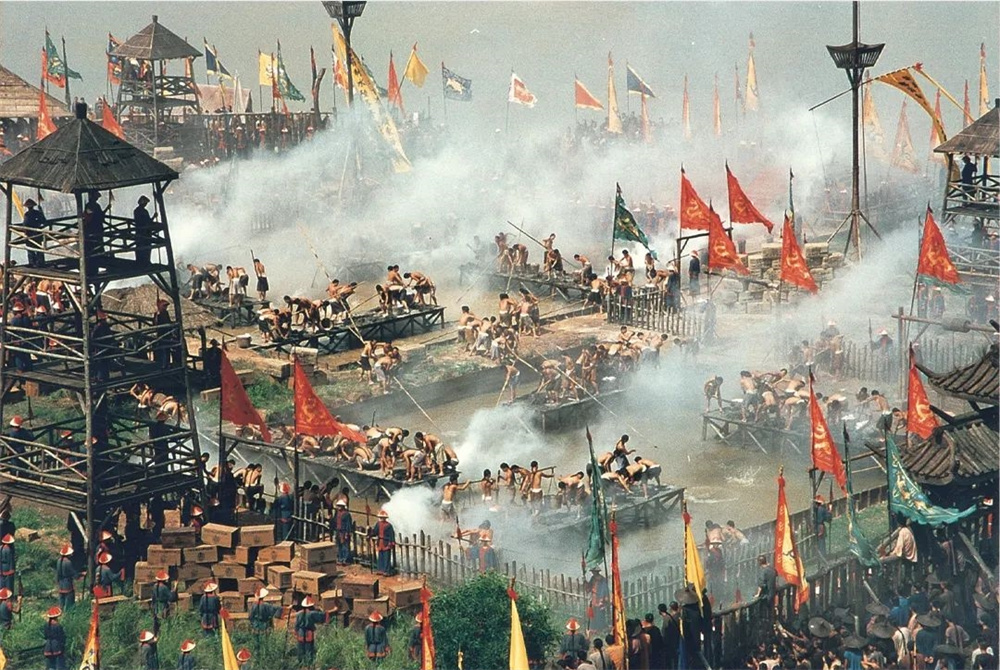
Stills from "The Opium War"
The Paper : Later, you also collaborated on "The Last Noble". This film is actually quite different from Director Xie's previous films. Today, it seems that it still has its own artistic standards and expressions, but it seems undeniable. From the beginning of this movie, Director Xie started to go downhill a bit.
Wu Zhennian : Indeed, Director Xie’s creative life has been full of ups and downs. In the mid-to-late 1980s, some cultural scholars wrote several critical articles, calling what he filmed the "Xie Jin model." At that time, this incident was quite irritating to Director Xie, who has always been a respected director. , both the industry, the audience, and leaders also like him, and Director Xie is used to this atmosphere. Suddenly one day those young scholars, who seemed to be very avant-garde and very trendy, said that he was "whitewashing the peace", that he was "conservative", and that the image of women he loved was submissive and had "bound feet". These remarks hit him hard. I'm confused, I'm a little confused. Later, this incident became a hot topic, and many people supported him and spoke for him. I also advised him: "The so-called 'model' is actually your style!" It is very important for a director to form a style in his work. Remarkable thing. But he was still sad, feeling that he was not avant-garde or trendy enough.
So when he went to film "The Last Noble", I think he was a little unconvinced. In fact, he wanted to "transform" when the tide of reform and opening up came. He wanted to prove that he was not "obsolete", but he was a bit separated from the audience who were familiar with him. He deliberately created an image of Li Tong - living in the United States, marrying an American boss, exiled himself, and finally committing suicide by drowning in Venice - a life scene and character that looked very westernized, fresh and even decadent. In fact, it is not in Director Xie's life experience. He is more familiar with the life scenes of ordinary people with Chinese national customs and regional characteristics, and his inner background is high-spirited and indomitable.
The Paper : A netizen read your book and wrote a review saying, “The author’s tone is like a little girl who is a fan.” Do you agree?
Wu Zhennian : It sounds a little uncomfortable at first, but when you think about it, it is indeed like this. In terms of the industry, he is a big director and I am a small director. I admire and respect him very much. I am grateful to such a big director for taking me all my life. In terms of gender, I am really a little girl in front of him. Director Xie is a very manly person, and he also looks tall and majestic, including the way he walks, dresses, and treats others. charming. Even if we got closer later, I would never feel that I had lost the nobility of my idol because of our familiarity. I have been his little fan all my life, and I still talk about him now.
The Paper : In addition to being a "fan", what impact do you think he has on you as his deputy and partner?
Wu Zhennian : I have always said that without Xie Jin, there would be no me, Wu Zhennian. At that time, I went to his wife with great trepidation and expressed my wish to join his crew. My marriage failed at that time, which was the lowest point in my life. I also became very depressed in the eyes of others and had no self-confidence. I even said that for a long time I didn’t know who I was or what kind of person I was.
I still remember that one day when we both came out of the mixing studio after finishing post-production, he handed me a cigarette, took two puffs, and suddenly said to me, "Xiao Wu, you are a good person." That's it. It was a sentence with no beginning or end and no context. He suddenly said it so lightly that I burst into tears within two lines. I still don’t understand why he gave me such a sentence as a reward at that time, but this sentence really solved a long-standing knot in my heart, and I suddenly felt that I was enlightened. Such a wise person, he can understand me and affirm me, which makes me feel deeply comforted. Since then, I have become more confident and lively, and have rekindled my passion for creation, and have made some movies and TV series that speak volumes about myself.
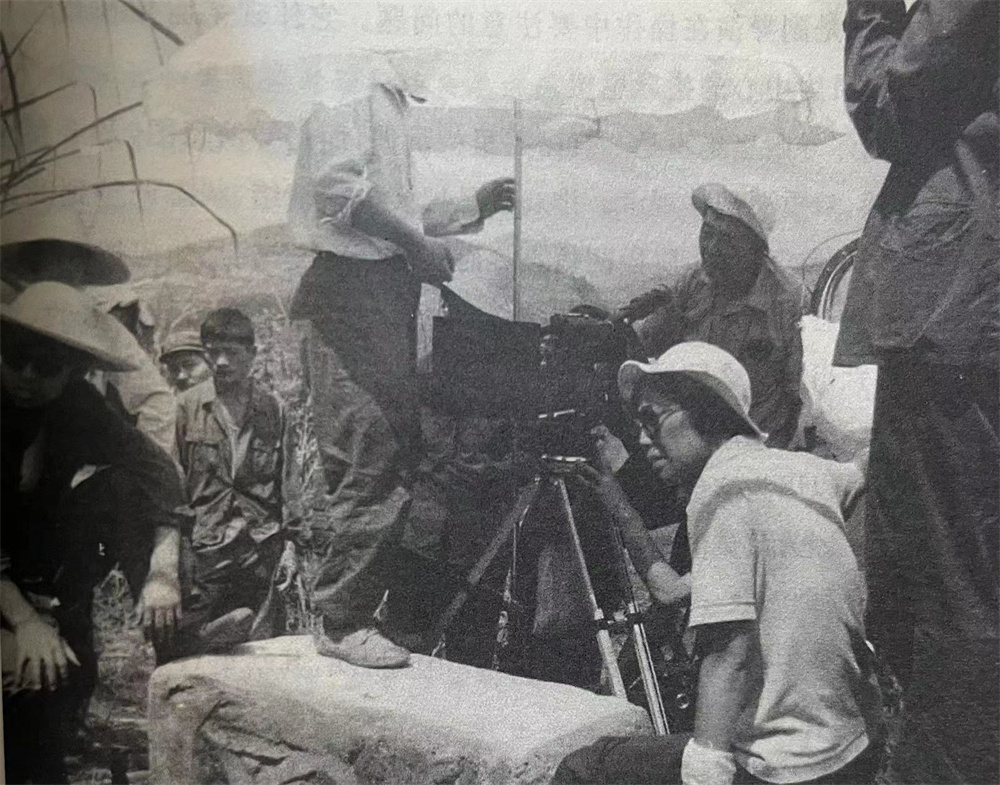
Photos from the set of "Wreaths Under the Mountain"
The Paper : This year is the 100th anniversary of Director Xie’s birth, and there are more activities to commemorate him. Does it make you think of him more?
Wu Zhennian : Every time someone comes to me and wants to interview Director Xie about the past, I feel very conflicted. Sometimes I feel a little helpless. Sometimes I even feel that the name of "Xie Jin's female disciple" is very embarrassing. I feel guilty and uneasy, and I always feel a bit like "thank you for diverting traffic". However, I convinced myself again and again that this is not just a memory and a tribute, but more of a nostalgia and gratitude. Director Xie’s works and personality should and are worthy of me describing and praising them to everyone. This is the responsibility and obligation that I, a disciple, should fulfill.
This year's 100th anniversary commemoration of Director Xie is rich and colorful, allowing us all to meet Director Xie once again. At the same time, I also hope that various activities can bring Director Xie’s film activities, artistic attainments, academic heights, and personality charm into full play in an environment with a more international vision, modern context, and youthful atmosphere. I think this is not only my personal hope, but perhaps also the expectation of more filmmakers and movie audiences!
